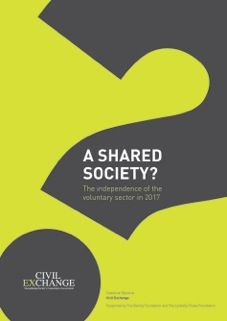Last week, Civil Exchange published the 6th annual health check on the independence of the voluntary sector, which the Baring Foundation initiated and has been supporting with Lankelly Chase since 2011.
In some ways, A Shared Society? The independence of the voluntary sector in 2017, tells a familiar story. That independence is still under serious threat and – despite some welcome concessions and improvements over the last 12 months – the challenges continue to grow in some areas. But there are certainly some positives on which to dwell.
Last year, the big message from the report was, ‘defend it or lose it!’ The sector has been very active in the last year doing just that. For example, the ‘no advocacy clause’ put forward by the Government was heavily resisted by sector leaders and has been moderated in response, even if problems remain.
This year, another positive is the opportunity of a fresh start in the relationship of government and the voluntary sector presented by Brexit, despite the wider social tensions that decision has also fuelled. Theresa May has promised a ‘Shared Society’ in which the Government will tackle ‘burning injustices’ and make Britain ‘work for everyone, not just the privileged few’. The voluntary sector is uniquely placed to speak up and act for communities that are marginalized and disempowered and there’s a chance to work on a common agenda with the Government going forward.
But lessons from the failed Big Society initiative must be learnt, including a move away from a top down, directive style of government, with a market based approach to public service reform, toward the collaboration with the voluntary sector and others that is required to genuinely address long-standing social inequalities.
Negative developments over a number of years also need to be reversed – including the so-called Lobbying Act, which remains unreformed despite Lord Hodgson’s recommendations; ‘gagging clauses’ in contracts; and poor commissioning practices that have undermined the independent action of many voluntary organisations. These challenges are not new, but they are having a cumulative impact.
Perhaps the most concerning development over the last 12 months is the growing evidence of self-censorship. According to a Sheila McKechnie Foundation survey, 1 in 5 charity professionals say that their organization now does less campaigning. One reason given is that campaigning is being seen as either too risky, or something they should not be involved in.
The Charity Commission’s negative guidance during the EU referendum – although later modified – undoubtedly contributed to this problem, with very few voices being raised at a vital time. The new grant standards have added to the confusion about what is permissible or not. These standards are much better than the ‘no advocacy clause’ but still seek to prevent government paying for what it calls ‘political lobbying’ and ‘undue influence’, including paid for in-house staff. The latest round of the Tampon Tax Fund, issued at the same time as the new standards, specifically excludes advocacy, campaigning and awareness-raising, suggesting that the problem is not going away.
Action has also been taken that will reduce the sector’s ability to challenge government decisions in the courts. ClientEarth, for example, won a second judicial review in 2016 forcing the Government again to revisit its plans on clean air. Polluted air is killing 40,000 people every year – and Client Earth’s challenging voice has been very effective on their behalf. Not longer after, the Government reversed cost controls on NGOs taking court cases on the environment and health, putting future interventions like that at risk. A group of charities, including ClientEarth, is now challenging these very changes.
Looking ahead, a much clearer statement from the Government about the legitimacy of charity campaigning and lobbying, particularly when financed by government, is needed, backed up by a more effective Compact. Statutory funding for those organisations that work with marginalized and disenfranchised groups is also in need of reform, as it does not work well for many that are seeking to tackle Theresa May’s ‘burning injustices’ and social inequalities. Small, community based and specialist voluntary organisations in particular need to be better supported if her ‘Shared Society’ is to be delivered. Grants might be part of the solution for them but unfortunately the new grant standards make them more like contracts, reducing their utility.
Ultimately, though, it is up to the voluntary sector to take the power and assert its voice on behalf of those disempowered communities and individuals who most need their help, strengthening those ties where necessary. Some say that it is better to stop talking about the threats to independence in order to encourage that more confident voice. But the message of the report is that unless those challenges are clearly recognized, discussed and addressed, it is those people and causes that the sector should serve who will ultimately suffer.
Caroline Slocock is Director of Civil Exchange and principal author of A Shared Society? The independence of the voluntary sector in 2017.
Further information
Caroline has also written about the report for Third Sector (‘The voluntary sector must take back control’) and for the Charity Times. (‘Time for the sector to speak up’).
